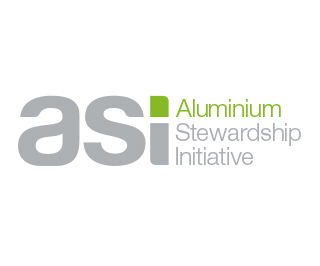General information
- Product group: Metal
- Label certification level: ASI Performance Standard V3
- Recognised for: Criterion ENV1.3 in the DGNB System New Construction of Buildings, Version 2018 and DGNB System Interiors, Version 2018, quality level 1.2
- Additional requirements: -
- Additional evidence required: ASI Chain of Custody Standard
- Validity: 11 February 2026
Our assessment
After reviewing the label in accordance with the requirements of the DGNB, we have come to the following conclusion:
The Aluminium Stewardship Initiative label (ASI label) is recognised as certified for criterion ENV1.3 of the 2018 version of the DGNB System for New Construction of Buildings and the DGNB System for Interiors, having achieved Quality level 1.2. This recognition is granted for the product group 'Metal'.
Reasoning
The Aluminium Stewardship Initiative (ASI) is a non-profit organisation that sets standards and offers certifications along the entire aluminium value chain. Its overarching goal is to advance the aluminium industry through transparency, sustainability and responsible practices. Through its work, the ASI supports the development and implementation of global standards in order to enhance environmental and social responsibility within the aluminium industry.
Recognition is based exclusively on factors considered for DGNB criterion ENV1.3.
The ASI label does not guarantee fulfilment of certain DGNB environmental requirements in all areas. This includes Requirement 2 (Protection of ecosystems). There is no obligation to halt deterioration. In particular, bauxite mining is problematic. Nevertheless, approaches and concepts for preserving biodiversity and protecting ecosystems are included in the ASI standard. It is not guaranteed that Requirement 4 affecting soil and landscape preservation is fulfilled, as there is no binding definition of land use reduction. Reducing the environmental impact of transportation is not part of the ASI label.
Some environmental requirements are considered partially fulfilled. Requirement 3 (Preservation of protective functions) is not fully met. The prevention of waste through waste management strategies, particularly in the case of toxic waste, only partially meets requirements, as prevention and risk reduction measures are not sufficiently specified. Approaches for the reduction of water consumption and the prevention of water pollution are covered, but there is a lack of specific measures and targets.
The ASI standard covers fundamental ILO core labour standards. Some social requirements are considered only partially fulfilled. There are no specific requirements affecting the documentation of occupational accidents, protection against chemical hazards or training at all stages of the supply chain. Furthermore, certification in countries with restricted freedom of association does not necessarily guarantee the comprehensive implementation of ILO standards. Concrete measures to promote voluntary negotiation and prevent discrimination remain unclear.
The preservation of cultural values is supported by avoiding the extraction of raw materials in regions of conflict and obtaining the approval of local communities, but specific measures to support the local economy are lacking.
Requirements that have been fully met can be found in the following overview (Assessment result). Based on this result, the label is recognised as achieving Quality level 1.2.
Validity
Approval is valid for one year from the release of this assessment report, i.e. until 11 February 2026.
Assessment result
Systemic requirements | Requirements fulfilled | Requirements partially fulfilled | Requirements not fulfilled/development potential |
|---|---|---|---|
| 1. Transparency/accessibility | ✓ | ||
| 2. Objectivity/impartiality | ✓ | ||
| 3. Awarding principles and monitoring mechanisms | ✓ | ||
| 4. Reference standard | ✓ | ||
| 5. Creation and further development | ✓ | ||
| 6. Alternative evidence for systemic requirements | ✓ |
Social requirements | Requirements fulfilled | Requirements partially fulfilled | Requirements not fulfilled/development potential |
|---|---|---|---|
| 1. Ban on child labour and forced labour | ✓ | ||
| 2. Compliance with ILO core labour standards | ✓ | ||
| 3. Compliance with labour laws | ✓ | ||
| 4. Compliance with the right to freedom of association | ✓ | ||
| 5. Equal remuneration and non-discrimination | ✓ | ||
| 6. Preservation of cultural values | ✓ | ||
| 7. Implementation of ethical business | ✓ |
Environmental requirements | Requirements fulfilled | Requirements partially fulfilled | Requirements not fulfilled/development potential |
|---|---|---|---|
| 1. Protection and preservation of biodiversity | ✓ | ||
| 2. Protection of ecosystems | ✓ | ||
| 3. Preservation of protective functions | ✓ | ||
| 4. Preservation of soil and landscapes | ✓ | ||
| 5. Preservation of soil quality | ✓ | ||
| 6. Preservation of natural water cycle | ✓ | ||
| 7. Reduction of water consumption | ✓ | ||
| 8. Prevention of water pollution | ✓ | ||
| 9. Prevention of waste | ✓ | ||
| 10. Preservation of air quality | ✓ | ||
| 11. Reduction of transports | ✓ |
Your contact
Email: labelanerkennung@dgnb.de

